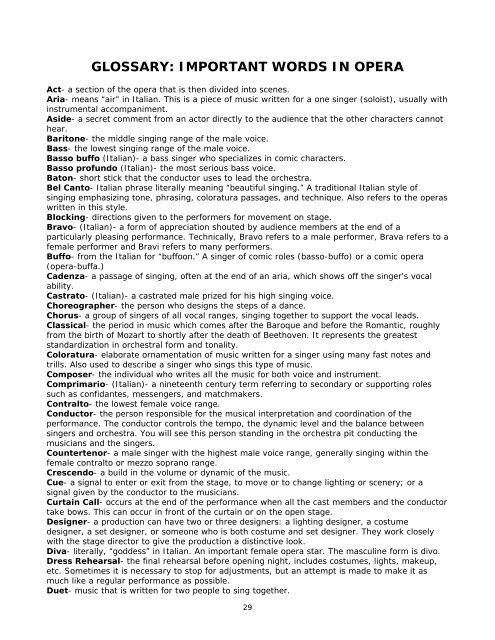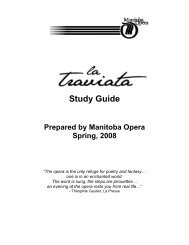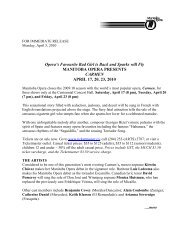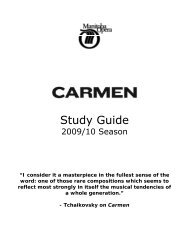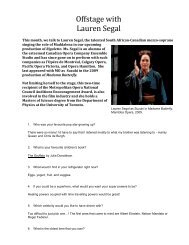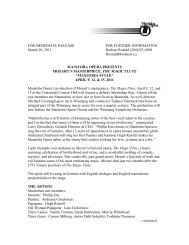The Barber of Seville Study Guide - Manitoba Opera
The Barber of Seville Study Guide - Manitoba Opera
The Barber of Seville Study Guide - Manitoba Opera
Create successful ePaper yourself
Turn your PDF publications into a flip-book with our unique Google optimized e-Paper software.
GLOSSARY: IMPORTANT WORDS IN OPERA<br />
Act- a section <strong>of</strong> the opera that is then divided into scenes.<br />
Aria- means “air” in Italian. This is a piece <strong>of</strong> music written for a one singer (soloist), usually with<br />
instrumental accompaniment.<br />
Aside- a secret comment from an actor directly to the audience that the other characters cannot<br />
hear.<br />
Baritone- the middle singing range <strong>of</strong> the male voice.<br />
Bass- the lowest singing range <strong>of</strong> the male voice.<br />
Basso buffo (Italian)- a bass singer who specializes in comic characters.<br />
Basso pr<strong>of</strong>undo (Italian)- the most serious bass voice.<br />
Baton- short stick that the conductor uses to lead the orchestra.<br />
Bel Canto- Italian phrase literally meaning “beautiful singing.” A traditional Italian style <strong>of</strong><br />
singing emphasizing tone, phrasing, coloratura passages, and technique. Also refers to the operas<br />
written in this style.<br />
Blocking- directions given to the performers for movement on stage.<br />
Bravo- (Italian)- a form <strong>of</strong> appreciation shouted by audience members at the end <strong>of</strong> a<br />
particularly pleasing performance. Technically, Bravo refers to a male performer, Brava refers to a<br />
female performer and Bravi refers to many performers.<br />
Buffo- from the Italian for “buffoon.” A singer <strong>of</strong> comic roles (basso-buffo) or a comic opera<br />
(opera-buffa.)<br />
Cadenza- a passage <strong>of</strong> singing, <strong>of</strong>ten at the end <strong>of</strong> an aria, which shows <strong>of</strong>f the singer's vocal<br />
ability.<br />
Castrato- (Italian)- a castrated male prized for his high singing voice.<br />
Choreographer- the person who designs the steps <strong>of</strong> a dance.<br />
Chorus- a group <strong>of</strong> singers <strong>of</strong> all vocal ranges, singing together to support the vocal leads.<br />
Classical- the period in music which comes after the Baroque and before the Romantic, roughly<br />
from the birth <strong>of</strong> Mozart to shortly after the death <strong>of</strong> Beethoven. It represents the greatest<br />
standardization in orchestral form and tonality.<br />
Coloratura- elaborate ornamentation <strong>of</strong> music written for a singer using many fast notes and<br />
trills. Also used to describe a singer who sings this type <strong>of</strong> music.<br />
Composer- the individual who writes all the music for both voice and instrument.<br />
Comprimario- (Italian)- a nineteenth century term referring to secondary or supporting roles<br />
such as confidantes, messengers, and matchmakers.<br />
Contralto- the lowest female voice range.<br />
Conductor- the person responsible for the musical interpretation and coordination <strong>of</strong> the<br />
performance. <strong>The</strong> conductor controls the tempo, the dynamic level and the balance between<br />
singers and orchestra. You will see this person standing in the orchestra pit conducting the<br />
musicians and the singers.<br />
Countertenor- a male singer with the highest male voice range, generally singing within the<br />
female contralto or mezzo soprano range.<br />
Crescendo- a build in the volume or dynamic <strong>of</strong> the music.<br />
Cue- a signal to enter or exit from the stage, to move or to change lighting or scenery; or a<br />
signal given by the conductor to the musicians.<br />
Curtain Call- occurs at the end <strong>of</strong> the performance when all the cast members and the conductor<br />
take bows. This can occur in front <strong>of</strong> the curtain or on the open stage.<br />
Designer- a production can have two or three designers: a lighting designer, a costume<br />
designer, a set designer, or someone who is both costume and set designer. <strong>The</strong>y work closely<br />
with the stage director to give the production a distinctive look.<br />
Diva- literally, “goddess” in Italian. An important female opera star. <strong>The</strong> masculine form is divo.<br />
Dress Rehearsal- the final rehearsal before opening night, includes costumes, lights, makeup,<br />
etc. Sometimes it is necessary to stop for adjustments, but an attempt is made to make it as<br />
much like a regular performance as possible.<br />
Duet- music that is written for two people to sing together.<br />
29


